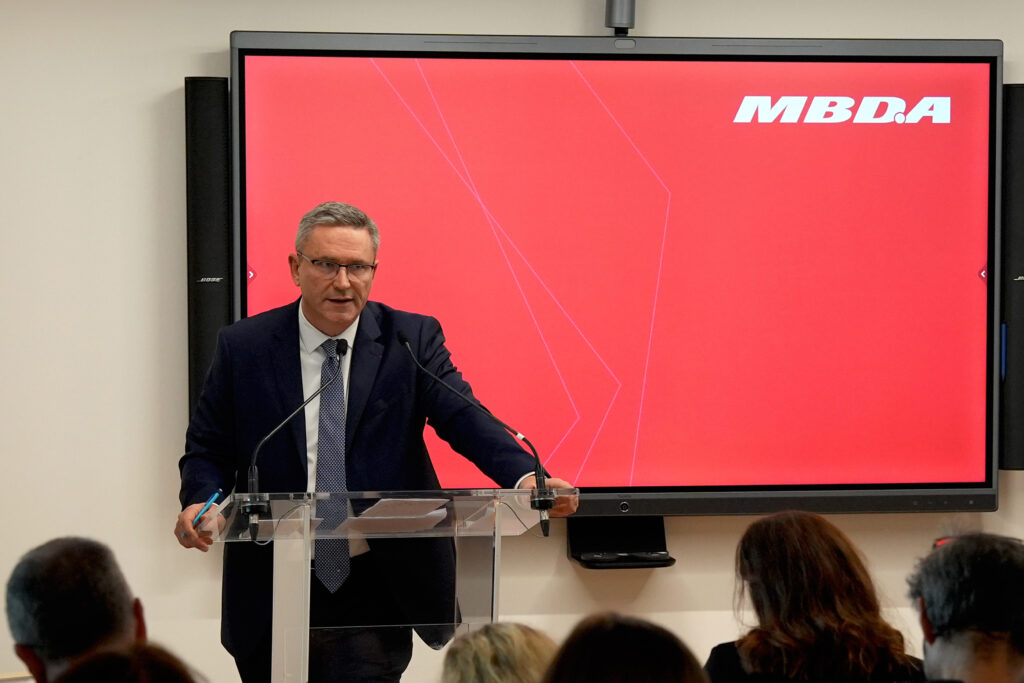By Pierre Tran
Paris – MBDA seeks to build missiles faster and in larger numbers, while keeping costs under control, with client nations rebuilding weapon stocks in response to major world conflicts, Eric Béranger, chief executive of the European missile maker, said March 13.
“We see 2023 was an extraordinary year,” he told a news conference on the company’s 2023 financial results. “There is one fundamental change in the world…force is challenging international rights more and more.”
There was a “wake up call in 2022,” he said, referring to the Russian invasion of Ukraine, followed by “dramatic events in the Middle East” in 2023, with clients requiring greater speed of delivery and higher volume in the company’s range of missiles.
Much of that surge in demand came from nations within Europe, besides the partner nations of MBDA, a joint venture held by Airbus (37.5 pct), BAE Systems (37.5 pct), and Leonardo (25 pct), with greater industrial cooperation with Sweden and Poland.
The far-reaching changes could be seen in 2023 with the U.K.’s urgent operational requirement, followed by France, to fit the Storm Shadow and Scalp cruise missile on “aircraft never made for this,” he said. The weapon integration was in weeks, rather than years as in previous times, he added.
That arming, authorized by London and Paris for Ukraine’s 24 fighter jets, marked a big policy shift, at a time when Washington and Berlin declined to send over respectively the Army Tactical Missile System and Taurus, François Heisbourg, an analyst, told March 12 the Anglo-American Press Association, a press club.
The Pentagon will send $300 million of weapons to Ukraine, having found cost savings in contracts, the AP wire service reported March 12. That would be the first U.S. arms delivery to Kyiv since December, following the Republican party blocking some $60 billion of military support for Ukraine in Congress.
Under Pressure
There was “huge pressure” from clients, seeking “acceleration” in shipping weapons, while remaining “affordable,” Béranger said. The French defense minister last week made a request which pointed up the need for speed, to renew French stocks of missiles and help Kyiv.
The minister, Sébastien Lecornu, told March 8 news channel BFMTV he had confirmed with MBDA an order for more than 200 Aster missiles – some to go to the French forces and some to Ukraine – and the company would be paid just as soon as the weapons were delivered.
It took some 42 months to build the Aster before 2022, the MBDA chief executive said, as the missile entered production in the time of the “peace dividend.” The company aimed to cut that lead time to delivery to below 18 months in 2026, and was making progress, he added.
Asked about Aster anti-air missiles, with a unit price of some €1 million, used to shoot down drones worth a few thousand and used by Houthi forces to hit commercial shipping in the Red Sea, Béranger said there have been media reports of two responses, namely the cost of defense compared to the cost of attack, and the defense cost and cost of the ship protected.
The top executive said he had a personal view, but he declined to comment.
The Aster arms French frigates and the army’s SAMP/T ground based air defense system.
MBDA is boosting production following hefty orders last year, such as those from Italy and Poland for the common anti-air system (CAMM) and its extended range (ER) version.
Poland’s order for its Pilica+ air defense system was the largest foreign deal last year, worth more than €2 billion, followed by a French order for Aster, the MBDA executive said.
Air defense missiles accounted for some 70 percent of 2023 orders, and orders from European nations accounted for 76 percent, he said. Those were nations in Europe besides the key partner nations of MBDA, namely Britain, France, Germany, Italy, and Spain.
The new schedule varied between the missiles and the company has speeded up production of the short-range Mistral compared to the Aster, he said.
“This is a fact,” he said. “But we’re on it.”
Work In Progress
There are clear targets for the Mistral, with four times to be more built per month, and the lead time for production cut by almost half, he said. The target for CAMM was to triple the monthly production, while the target for Aster was to increase production rate by almost 50 percent, and cut the lead time by around two.
“This is work in progress,” he said.
Series production of the Enforcer, a man-portable missile, started at the end of 2023 in Germany, and the target was a “four digit” number by 2026, he said. The company was on track to boost production of the Akeron land and naval weapon by 2.5 and improve the lead time by 40 percent.
MBDA plans to invest more than €2.4 billion in factories and toolsets over the next five years to boost production, he said. Some €1 billion of that would be invested in France, and more than €500 million in the U.K.
To increase production, he said, the company was doubling capacity in Bolton, near Manchester in northern England, which was “a very important investment,” building a second assembly line in Italy to build the CAMM, doubling the size of its assembly line in France, and building a new factory in Germany to assemble the Patriot missile through Comlog, its joint venture with Raytheon.
The company started to increase availability of key stocks of raw material in the Covid crisis, and speeded that up in response to the assault on Ukraine in 2022 ordered by Russian president Vladimir Putin.
MBDA is increasing stocks to 80 tons of “specific special irons” needed for missiles, compared to the present four to five tons, he said. Stocks of titanium have increased to allow building several thousand missiles and more electronic components are also being stockpiled.
Béranger welcomed the March 5 publication of the European Defence Industrial Study by the European Commission, which he saw as opening up opportunities for cooperation not just among the 27 E.U. member states, but also the U.K. as a European nation on geographic terms, even though London had bailed out of the E.U. in the Brexit move.
Béranger said he joined MBDA just less than five years ago, and the company was not the same since his arrival. Just in the figures alone, he said, the order book had risen by half, sales were up 40 percent, and staff had grown 30 percent.
The 2023 order book stood at an all time high of €28 billion, he said, with that backlog split 50/50 between the domestic market, namely Britain, France, Germany, Italy, and Spain, and export deals.
The 2022 order book was €22.3 billion.
The 2023 orders were €9.9 billion, up 10 percent from the previous year.
Sales last year rose to €4.5 billion, up from €4.2 billion in 2022. The company planned to recruit 2,600 staff this year.
Béranger declined to give profit figures, nor whether profit growth had been in single or double digits.
French Strategy Switch
The row among allies sparked by French president Emmanuel Macron at the end of February on the possibility of sending Western troops to Ukraine was a change in tone rather than strategy, Heisbourg told the AAPA press club.
The French switch in strategy took place last June-July, he said, with Paris accepting the long term security of Ukraine lay in joining Nato, and giving the green light for sending over initially the Storm Shadow, then Scalp, cruise missile.
“That was the first time, when in the field of military support, European countries essentially broke ranks with Washington,” he said. “That, in turn, helped produce the only strategic breakthrough which Ukraine got in 2023.”
Those weapons allowed Ukraine to break the Russian naval blockade in the western part of the Black Sea, he said, and gave access to international markets and ship some 23 million tons of grain. That helped the Ukrainian economy and helped nations in Africa and the Middle East.
On relations between France and the U.K., there was a paradox, he said.
“French-British defense industrial cooperation overall is doing very well,” he said, as there was “true defense integration (in) the missile house MBDA…an integrated Franco-British firm with Italian and German stakeholders and shareholders.”
The missile company was working despite Brexit, and the same could be seen with a French defense electronics company, Thales, he said.
“Thales is one of big players in the U.K.,” he said.
“If only the U.K. were part of the European Union, things would be much easier,” he said. “But unfortunately that is not very much in France’s hands, and I do not see the Brits changing their minds about Brexit any time soon.”
Between the two countries there was a similar military culture, similar attitudes toward the defense industry, and a vision of balance between export and domestic markets, he said.
“Britain is quasi-absent in the big European debate which has been opened by the competing ambition by (German chancellor Olaf) Scholz and Macron – and Macron’s assertiveness in the last couple of weeks,” he said.
“Britain has self isolated itself,” he said. “It is sad, it is not logical, but it is very real.
“I simply hope we will soon have a British government which will be in a position to project itself in the long term future rather than acting as if it were inevitable.”
With a U.K. general election due to be held in the next 12 months, there appeared little the present government could do, he said.
Featured Image: Credit: MBDA
MBDA held its annual press conference on 13 March. The company’s CEO shared the Group results for 2023 together with some insight into tackling future challenges in the face of growing demand in a complex international context.



